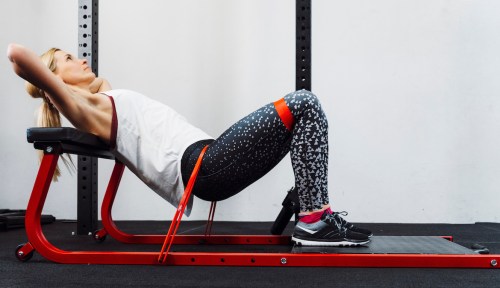Spending time in the fitness world—either IRL or online—you’re bombarded with inspirational words. Quotes like “Better sore than sorry” are emblazoned across the walls of prominent boutique studios; “The only bad workout is the one you skip,” reads a meme that appears on my Instagram Explore page every day; “You better hustle for that muscle!” shouts my favorite trainer while coaching the class through a set of burpees. For some, these phrases are simply incentive to get moving, but for anyone who has struggled with an eating or body dysmorphic disorder, they can be dangerous.
Tired of hearing this sort of “motivation,” registered dietitian and eating disorder specialist Anna Sweeney, RD, shared her thoughts on Instagram back in August: “If you’re a fitness professional, you are working with humans with eating disorders,” she wrote. “If you’re a fitness professional, know that your words of encouragement and your words of negative reinforcement are heard long after training sessions end. Your words become the chant for an eating disorder.” Sweeney’s Instagram post received more than 18,000 likes and hundreds of comments—from both fitness professionals and the people who take their classes—making it clear that the message had landed.
Encouraging clients is one of the cornerstones of a trainer’s job, but even words that are served up with the best intentions can quickly become triggering. “The eating disorder mindset is so different than the mindset of a person without the disorder,” says Talkspace therapist Jill Daino, LCSW. “Something a trainer would say to someone who hasn’t struggled with an eating disorder is going to land one way, and they could say the same words to someone who is struggling or has struggled with an eating disorder or body-image issue, and it’s going to land totally differently.”
It’s not only the typical “go hard or go home” mantra that’s problematic; there’s also an issue with the way bodies are discussed in the context of a fitness class. “The most glaring trigger for me is the blatant body shaming that happens in classes,” says Helen Phelan, a Pilates instructor and intuitive eating coach in New York City. “When trainers cue exercises by saying they’re for your ‘bat wings’ or ‘love handles’—any of these derogatory euphemisms for body parts—it attaches negative value that can be really distracting and take you out of the moment.”
Why language matters
According to Daino, there’s a widespread misconception that eating disorders are only about food, but it’s also common for unhealthy exercise behaviors to be one of the symptoms of an eating disorder. “You’re not going to find that everyone with an eating disorder also over-exercises, but it is very, very common for people to use exercise as a form of purging, because it’s socially acceptable to say you go to the gym X number of times a week,” she says. “Some people wear that as a badge of honor.”
And some of the language that’s used in fitness classes perpetuates—and even encourages—behaviors that could be unhealthy for people dealing with eating or body image issues. Think: Trainers asking their clients to sign up for 100-class challenges, prompting people to stick around for a double session, or talking about using fitness as a way to “burn off” something you’ve eaten. “If someone is going to the gym, [they’re often] being praised for engaging in practices that are not actually health-prompting but are deleterious to overall health,” says Sweeney. “This shows up frequently in fitness culture because ‘dedication’ is deemed uniformly evident of a commitment to ‘health,’ but really it can be indicative of a commitment to a disorder, which is quite the opposite of health.”
Case in point: Last week, I was lying on my mat—exhausted and drenched in sweat after completing a grueling 28-minute HIIT workout—when the trainer asked if anyone planned to stick around for the next session. Immediately, my eating-disordered brain (I’ve struggled with anorexia since I was 16) began to race. Were the dozens of burpees I’d just put myself through not enough? Should I be sticking around for another session, especially considering that it’s free and I have nothing else to do?
The answer, according to every professional that I spoke to on the subject, is a resounding “no.” Whether you’re struggling with an eating disorder or not, there’s no need to feel pressured into doing two-a-days. While getting enough exercise is undeniably important (The Department of Health and Human Services recommends 150 minutes of moderate aerobic activity or 75 minutes of vigorous aerobic activity per week), getting too much of it can present problems, such as increased risk of injury, heightened anxiety and trouble sleeping. “There are all of these streaming opportunities that allow you to dedicate an entire day to moving your body if you so choose—and you would receive accolades for doing so—but at the end of the day, is that actually in the best service of you being in your body?” asks Sweeney. “I can’t imagine a human—other than a professional athlete—who’s getting anything positive from moving their body all day long.”
How trainers can be more mindful of their language
Eating and body dysmorphic disorders can be hard to spot, and aren’t relegated to people with a particular body size or shape. According to the National Association of Anorexia Nervosa and Associated Disorders, only 6 percent of people with eating disorders are medically diagnosed as “underweight.” But as Sweeney put it in her post, trainers need to know that “some of your most committed, compliant, dedicated clients, are the ones who are most deeply entrenched in their eating disorders.”
While it certainly isn’t a trainer’s job to act as an eating disorder specialist, it is up to them to do their part not to exacerbate the problem. “As any sort of fitness or wellness professional, you should be very aware that you’re interacting with people with either full-blown eating disorders or disordered eating habits every day, whether they communicate that to you or not,” says Phelan. “And I think that the best thing that we can expect from fitness professionals is sensitivity, understanding, and not pressuring or shaming.”
For trainers, that means shifting the narrative around motivation. One way to start? Getting rid of the “no pain, no gain” edict, and doing away with any sort of language that could potentially make someone feel crappy about their body during a workout that’s supposed to make them feel good. Phelan says that trainers should cue exercises with anatomical language that promotes a positive message, “saying ‘strengthen your triceps’ instead of mentioning bat wings, and talking about the benefits of having strong triceps as far as their function goes, instead of their aesthetic.” That type of instruction can be inspirational without triggering anyone.
“I think that anything aesthetic-focused is just lazy cueing, because it shows that trainers haven’t educated themselves, and I think oftentimes when people do use those [aesthetic-focused] terms, it’s because they just don’t know what else to say,” says Kelsey Lindell, a Minneapolis-based fitness trainer and founder of Shape Society Collective. “So let’s train people not to say those things, and teach them another vocabulary that they can use to help motivate people. Because with proper training, they could make their classes much more inclusive and inviting.”
While eating disorder education isn’t currently included in the training certification process (though Phelan and Sweeney both think it should be), there are plenty of trainers who have made ‘body neutrality’—which focuses on seeing your body in terms of its function rather than appearance—a cornerstone of their practice. If you’re someone who is struggling with an eating disorder or body dysmorphic disorder, it’s worth seeking out trainers and workouts that prioritize the mental and emotional benefits of exercise over the physical ones. A couple to consider: Melissa Wood Health, The Be.Come Project by Bethany Meyers, and Jessamyn Stanley’s The Underbelly. And for trainers who want to educate themselves and start to move away from the problematic language that has long dominated the industry, Sweeney suggests Jessi Haggerty’s Nutrition and Body Image Training Course for Fitness Professionals, which provides instruction on how to create a more size-inclusive environment within a fitness class.
Exercise is meant to make you feel good—not just physically, but mentally—and we can’t keep repeating the same worn-out language without having the opposite effect.
Oh hi! You look like someone who loves free workouts, discounts for cult-fave wellness brands, and exclusive Well+Good content. Sign up for Well+, our online community of wellness insiders, and unlock your rewards instantly.
Sign Up for Our Daily Newsletter
Get all the latest in wellness, trends, food, fitness, beauty, and more delivered right to your inbox.
Got it, you've been added to our email list.











